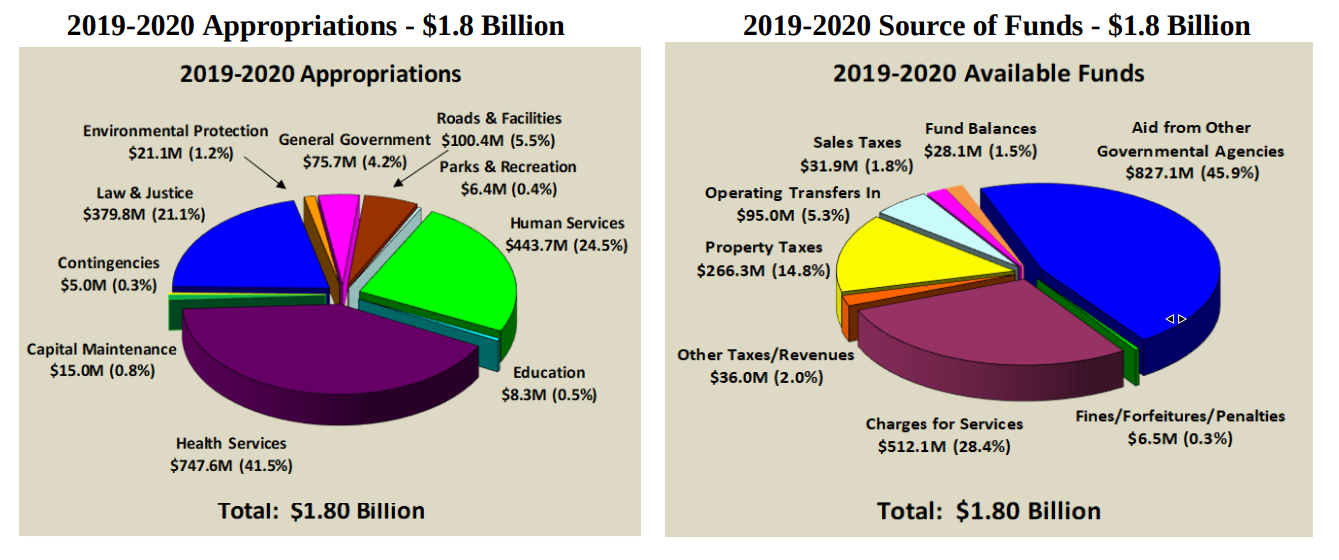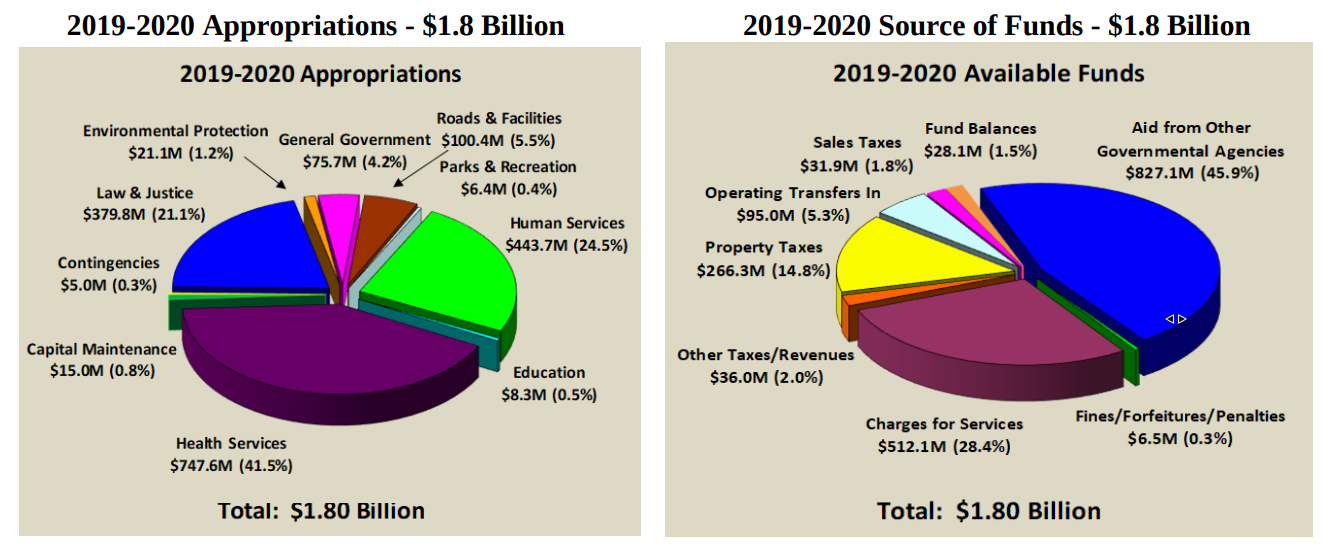
(STOCKTON) – The San Joaquin County Board of Supervisors unanimously approved the 2019-2020 Final Budget on June 26, 2019. The approved $1.8 billion budget includes a $40.8 million increase from the previous year and provides necessary funding for Countywide programs and services including special districts. The 2019-2020 Final Budget supports the Board’s strategic priorities including good governance, fiscal responsibility, law and justice, economic development, and water.
“The programs and services contained in the 2019-2020 Final Budget are not only beneficial to the residents of San Joaquin County, but they also support the Board’s strategic priorities and rigorous fiscal policies,” said San Joaquin County Board of Supervisors Chair, Miguel Villapudua. “I am very proud that the County continues to make sound and practical financial choices that will support programs today and into the future.”
The 2019-2020 Final Budget supports San Joaquin County’s adopted strategic priorities, including:
- Good Governance & Fiscal Responsibility: The Final Budget is structurally-balanced where ongoing revenues fund continuing operating costs. The Budget also invests in local resources that address new mandates and the Board of Supervisors’
highest priority areas. The Countywide good governance and fiscally responsible policy provides meaningful goals for reserves in the event of another economic downturn.
- The County’s unfunded pension liability continues to challenge the County’s financial sustainability. While the final actuarial report for 2018 has not been finalized, the annual financial report indicates the investment earnings falling far below the expected earnings rate of 7.25% at (-2.11%). The Final Budget assumes retirement rates to increase approximately 4% in calendar year 2020. For every 1% increase in the retirement rate, the total cost to the County is approximately $4.9 million, with the Net County Cost of $1.7 million.
- With the addition of $2.1 million to the County’s Reserve for Contingencies, the recommended Reserve for Contingencies is anticipated to be set at $90.2 million in 2019-2020.
- Public Safety: The recommended budget for Law and Justice totals $379.8 million, which is an increase of $31.6 million from 2018-2019. Overall, the budget includes a net increase of 63 positions for all Law and Justice budgets: 26 in the Child Support Services budget, 16 positions in the Sheriff’s budgets, 10 in the District Attorney’s budgets, 5 in the Probation budgets, 4 positions in Correctional Health Services, and 2 positions in the Public Defender’s budget. The District Attorney’s Cold Case Unit was expanded by adding one Deputy District Attorney to the one full-time Investigator and one part-time Investigator to form a Cold Case Task Force in the District Attorney’s Office. In addition, two Deputy Sheriffs were added to an existing Sergeant to establish a Cold Case Unit in the Sheriff’s Office.
- Economic Development: In 2015-2016, a reserve for Economic Development was established to support the County’s promotional/marketing efforts and economic development activities/programs, including incentives for businesses to relocate and/or expand in San Joaquin County. The balance as of April 30, 2019 is $885,000. For2019-2020, the budget directs $386,000 of the Transient Occupancy Tax (Hotel/Motel Tax or TOT) to this reservefor an ending balance of $1.3 million. This represents the amount of the projected TOT that has not beenprogrammed in the Final Budget for economic development-related activities and programs.
- Water: The Final Budget directs $730,000 toward the County’s continuing efforts to respond to the CaliforniaDelta Conveyance single tunnel project including legal action, advocating for positions, responding to proposed
legislation, building and participating in coalitions, communicating positions through media and other outreachavenues, and coordinating with various County water and Delta interests, and other Delta related issues.
Other notable budget items include:
- The final Health Services budget is $747.6 million, a $1.8 million increase from 2018-2019.
- The final Environmental Protection budget is $21.1 million, a $3.1 million increase from 2018-2019.
- The final Human Services budget is $443.7 million a $38.3 million increase from 2018-2019.
As part of the final action on the 2019-2020 Budget the County Board of Supervisors made the following adjustments:An increase of $43,525 to fund the Veteran’s Treatment Court and an increase of $155,004 to fund an additionalposition at the County Assessor-Recorder-County Clerk.
“The 2019-2020 Final Budget provides a detailed road map for achieving our fundamental priorities of promotinggood governance, protecting our residents, attracting business and well-paying jobs, safeguarding the Delta andsustaining our financial outlook,” said San Joaquin County Administrator, Monica Nino. “This budget demonstratesthe County’s ongoing commitment to supporting the health, safety, and quality of life for local residents, ourresponsibilities as a major employer in the community, and steadfast efforts to make San Joaquin County a greatplace to live, work, and play.”
In addition, the San Joaquin Board of Supervisors also discussed the need for a policy establishing homelessness asan operational priority for all County departments. This draft policy would help to improve the quality of life byaddressing and limiting the impacts of Homelessness in San Joaquin County, This policy will be discussed at theJuly 23, 2019 Board of Supervisors meeting for final approval.
To review the approved budget or for additional budget highlights and details, please visit our website at:www.sjgov.org/department/cao/county-budget.
2019-2020 FINAL BUDGET HIGHLIGHTS
The 2019-2020 Final Budget is a structurally balanced budget totaling $1.8 billion. This represents an increase of $40.8 million from the 2018-2019 Budget. Costs and revenues by account include:

The estimated General Fund year-end balance for June 30, 2019 is estimated at $30.5 million.
ADDITIONAL IMPACTS
- Labor Agreements: The County has current labor agreements with 86.8% of the County labor force leaving 13.2% expired or near expiration by June 30, 2019. The bargaining units with expired or expiring contracts are the Law Enforcement Management Association (LEMA), Deputy Sheriff’s Association (DSA), Sheriff Deputy Sergeant Association, Physicians (UAPD), and Nurses (CNA). Additionally, Service Employees International Union (SEIU) MOUs which covers the majority of the County’s workforce will expire on September 5, 2019. The total number of positions within the bargaining units that are expired or will expire on or before September 5, 2019 is 5,793 or 87.5% of the workforce (includes recommended position changes for 2019-2020). The potential costs resulting from these negotiations are unknown, therefore, are not included in the Final Budget.
- Unfunded Retirement Liability: One of the County’s largest increases in operational costs remains retirement expenses. Approximately 51% of the Final Budget is for salary and employee benefits. The 2019-2020 Final Budget includes $23.9 million for contributions toward the unfunded retirement liability with a Net County Cost of $8.2 million. The balance of the Unfunded Pension Liability Reserve as of March 31, 2019 was $25.5 million. The Final Budget adds an additional $7.3 million to the Reserve.
- Animal Services: Sheriff’s Animal Services Officers have been successful in reuniting animals with their owners. In 2018-2019, a total of 1,868 animals were reunited with their rightful owners, saving the County approximately $607,100 in costs for shelter services.
- Cannabis: On November 6, 2018, the voters failed to approve Measure B (Cannabis Business Tax) by the required 66.7%. On January 8, 2019, County Counsel sought direction from the Board of Supervisors regarding development agreements and the Board directed Counsel to bring back the necessary modifications to the county ordinance to allow for commercial cannabis businesses through development agreements. On May 21, 2019 the Board approved both Title 4 and Title 9, which allows for a Commercial Cannabis Business to operate in the unincorporated areas of the County only with a Board approved commercial cannabis development agreement.
- Child Support Funding: DCSS is leading a coalition of statewide Child Support Departments to pass a budget proposal which changes the funding structure to be more equitable and sustainable. The Governor has included in his 2019-2020 final budget $19.1 million State General Fund dollars will be matched with Federal dollars for a total of $56.0 million. If approved, these funds will be allocated to 21 underfunded county Local Child Support Agencies. San Joaquin County’s allocation of the $56.0 million is $3.1 million and it is included in the 2019- 2020 Final Budget.
- In-Home Supportive Services (IHSS): The Human Services Agency continues to monitor the IHSS program which provides assistance and services to eligible older or disabled individuals to help them remain safely in their home. Beginning in 2019-2020, the total MOE for the State will be re-based to the 2017-2018 level reflecting the addition of $241.1 million of State General Fund. The annual inflation factor will begin in 2020-2021, and has been reduced from 5% to 4%. The State’s annual budget will contain General Fund that is intended to fully fund the non-Federal share of cost for County IHSS and Public Authority administration. The State is indicating that no additional County share of cost is to be required for administration. The projected cost for San Joaquin County is decreasing from $18,005,609 to $17,068,897. The County will utilize 1991 Realignment funding to cover $8,657,595 of this cost.
- SJGH-Phase II Acute Care Patient Wing Expansion Project: Construction of the Phase II Acute Care Patient Wing Expansion Project was completed in 2018-2019. The new facility replaces 45 of the 89 inpatient beds in the seismically non-compliant Towers building. The new patient wing is scheduled to be operational in fall 2019. Project funding was provided by the Hospital Enterprise Fund without incurring additional debt or subsidy from the General Fund.
To review the full budget proposal or for additional budget highlights and details, please visit the website at: www.sjgov.org/department/cao/county-budget.
###